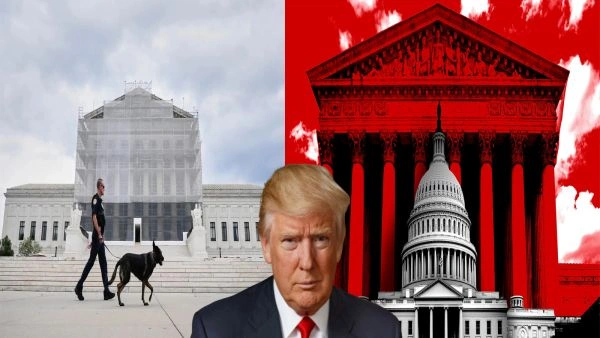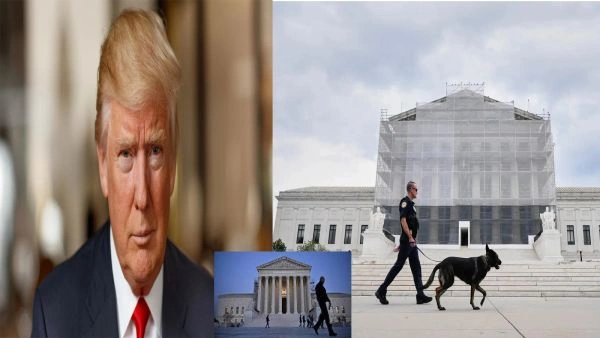The Supreme Court is set to begin its fall term on Monday,
where it will examine the unprecedented expansion of the US presidency’s powers under Donald Trump.
The key issue, according to Erwin Chemerinsky, dean of the University of California Berkeley Law School, is whether the Court will act as a check on President Trump’s authority or merely approve his actions.
The US Supreme Court’s fall term, commencing this Monday, is set to critically examine the unprecedented expansion of the presidency’s powers under Donald Trump.
The central focus, according to a prominent legal expert, is the Court’s stance on this executive power.
A top legal academic is questioning the role the Supreme Court will play in scrutinizing the actions of President Donald Trump and his administration of California Berkeley Law School.
The legal community is closely watching the conservative-leaning bench—which includes three justices appointed by Trump—to see if the Republican leader will continue to secure legal victories, as he has frequently since returning to office. Past rulings have already permitted actions like mass firings of federal workers, dismissals of independent agency members, withholding of Congressional funds, and racial profiling in immigration enforcement.
Beyond the presidential power scrutiny, the docket includes significant cases on voting rights,
State legislation banning transgender athletes in girls’ sports, and a religious freedom case concerning a Rastafarian prisoner’s dreadlocks.
However, the “blockbuster” case this term involves the former administration’s levying of hundreds of billions of dollars in tariffs on imports, with lower courts having previously ruled that Trump lacked the statutory authority for these actions. The Supreme Court’s decision on this will be a major indicator of its approach to executive authority.
A leading legal advocacy group is raising concerns over the Supreme.
Court’s approach to cases involving the Donald Trump administration, particularly its reliance on the rapid-fire shadow docket.Cecillia Wang, the national legal director for the American Civil Liberties Union (ACLU), asserted that the Court has gone “out of its way, really bend over backwards, in order to green-light Trump administration positions.”
This criticism is largely focused on decisions made through the controversial emergency or “shadow” docket. This process, which Wang implicitly criticizes as the “legal equivalent of fast food,” allows the Court to issue high-stakes orders quickly. Decisions on the shadow docket are characterized by minimal legal briefing, the absence of oral arguments, and only a “paltry explanation” for the rulings,
Raising transparency and due process concerns among legal experts.
Legal experts and the Supreme Court’s own liberal minority are condemning the increasing use of the emergency docket—also known as the “shadow docket”—for controversial rulings.
Samuel Bray, a law professor at the University of Chicago, likened the quick decisions made on this docket to the legal equivalent of fast food,” highlighting concerns over the expedited process and lack of thorough review.This pattern suggests the emergency procedure has been instrumental in overturning challenges to the previous administration’s policies.
In contrast to these expedited rulings, a high-stakes case concerning the Trump administration’s tariffs will follow the traditional path, involving full briefing and oral arguments.
This major case is scheduled to be heard on November 5th.
The Supreme Court is poised to deliver a major ruling that could potentially impact hundreds of billions of dollars and reshape the balance of executive and legislative power.
The case centers on former President Donald Trump’s decision to unilaterally impose extensive tariffs by invoking the International Emergency Economic Powers Act (IEEPA). Trump’s administration bypassed Congress by asserting that the nation was facing an “emergency” due to the trade deficit—an interpretation of the IEEPA that is now being challenged.
A legal expert issued a warning about the high stakes involved in the case challenging the former president’s authority to impose the extensive tariffs.Curtis Bradley, a law professor at the University of Chicago.
Readmore Chinese electric cars price many of its brands kill off 2025-26
Other Key Presidential Power Cases
Beyond the tariffs, the Court’s upcoming sessions in December and January will hear other high-profile cases involving the power of the president. These include weighing in on Trump’s effort to fire members of independent agencies, specifically challenging the dismissal of members of the Federal Trade Commission (FTC) and Lisa Cook, a governor of the interest-rate setting Federal Reserve Board.
Critical Voting Rights Challenge
The judicial calendar also features a critical voting rights case. On October 15, the Supreme Court will hear arguments concerning the creation of a second Black majority congressional district in Louisiana. The case was brought by “non-African American” voters who are contesting the district, claiming it constitutes unconstitutional racial gerrymandering.
The Supreme Court’s fall term will feature cases with monumental implications for civil rights, including a direct challenge to the Voting Rights Act (VRA) and state bans on transgender athletes.
Threat to Majority-Minority Districts
The Louisiana racial gerrymandering case poses an existential threat to a key provision of the Voting Rights Act—the section that permits the creation of majority-minority districts to counteract historical racial discrimination.
A ruling in favor of the plaintiffs in this case “would deal a severe blow” to this VRA provision.The stakes are incredibly high,” stated Sophia Lin Lakin, Deputy Director of the ACLU’s Voting Rights Project.
The forthcoming Supreme Court decision regarding the Louisiana congressional map is poised to have consequences that reach far beyond the state’s borders.The ruling will be pivotal, as it is expected to not only determine the “next steps for Louisiana’s congreTransgender Sports Bans and Religious Freedom
Also on the Supreme Court’s docket are significant social issues:
Transgender Athletes: The Court will hear challenges to state laws in Idaho and West Virginia that ban transgender girls from participating in girls’ sports teams.
Religious Freedom: A notable religious freedom case, set to be heard on November 10, has unusually united legal advocates from both the political left and right. The case involves Damon Landor, a devout Rastafarian whose long hair was forcibly cut while he was incarcerated in a Louisiana prison.
A unique religious freedom case currently before the Supreme Court involves.
Damon Landor, a devout Rastafarian. Landor is seeking permission to sue individual officials of the Louisiana Department of Corrections for monetary damages, claiming they violated his religious rights by forcibly cutting his hair.
This damages action presents a challenge for the Supreme Court.
Judicial Hostility to Damages: According to Samuel Bray, a law professor at the University of Chicago, the Court is generally “hostile to approving damages actions against individual government officials.
This tendency makes it difficult for plaintiffs like Landor to secure monetary relief from state employees.
Pro-Plaintiff Trend in Religious Cases: Conversely, Bray noted that the right-leaning Court has shown a tendency to “side with the plaintiffs in religious liberty cases.”
This creates a high-stakes scenario where the Court must balance its procedural skepticism toward suing government officials against its established inclination to protect religious freedom claims.


